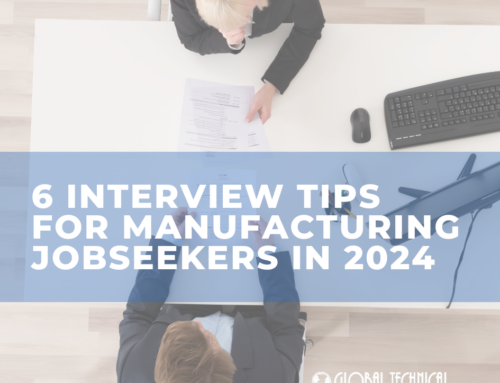Interviews are stressful – no matter how many you’ve done before. One of the best things you can do is be as prepared as possible and part of that is understanding what questions might be asked and how you can answer them.
Even if you have a strong resume and cover letter, the interview is your opportunity to demonstrate your personality, experience, and credentials. One of the most effective ways to prepare is to anticipate questions and prepare thoughtful responses, before you are in the interview!
In this blog, we will give you the information and insights you need to answer the six most popular manufacturing interview questions.
So what are the top 6 most-asked questions when you are interviewing for a manufacturing job?

Question 1 – Tell me about yourself.
In most interviews, the first question is meant to ease the tension and help the interviewer get to know you a little better. Although this question can appear easy to answer, it offers the perfect chance to make an impactful first impression. Your response should be centered on your credentials and professional accomplishments that are relevant to the manufacturing sector. Remember that the interviewer is curious in how you might benefit their business, so be sure to showcase any experience or abilities that tie directly into the role or industry.
There are no one-size-fits-all answers to this question, but a good general rule of thumb is to keep it focused and concise. You might begin by outlining your educational background and work experience before talking about your abilities and accomplishments. Make sure your response is as specific as possible for the particular business and position you are looking for. Be prepared to expand on your response since the interviewer will probably ask you more questions about your history and experience.
Question 2 – What is your experience in manufacturing?
You’ll probably be questioned throughout the interview about your background in the manufacturing industry. By emphasizing your transferable skills, you may still show your potential even if you have never worked in manufacturing previously. You could have experience in fields like logistics, engineering, or quality control that are applicable to the job. Customer service, hospitality, and other fast-paced work environments have a lot of skills that manufacturers value!
It’s important that you show your understanding of the manufacturing industry when answering this question. Before the interview, do some research about the company and the position you’re applying for to learn the exact qualifications they’re looking for in candidates. Then you can emphasize any experience you have that connects to the job and the needs of the company.

Question 3 – What did you enjoy most about your last position?
The interviewer can learn more about your motivations and areas of interest by asking this question. Describe in detail and honestly what you liked best about your prior position. This is especially important if you worked in manufacturing before.
Consider the advantages of your previous position when you respond to this question. Talking negatively about your previous workplace or coworkers might raise a red flag with the interviewer. Instead, highlight your achievements and qualities that you acquired in your previous position and how they match to the job you are going for.
Question 4 – Where do you see yourself in three years?
This question shows the interviewer that you have ambition and a plan for your career.
When answering this question, avoid being too general or vague. Instead, be specific about your career goals and how you plan to achieve them. For example, if you hope to become a team leader or manager, talk about the steps you plan to take to develop the necessary skills and experience.

Question 5 – Describe a time when you solved a problem on a job.
This question assesses your problem-solving skills and how you handle challenges. Employers want to know that you can handle unexpected situations, make informed decisions, and take the necessary steps to resolve problems. Don’t use this as a way to talk bad about anyone or any previous employer – and make sure it’s a problem you actively solved.
When answering this question, it’s important to be specific and detailed about the problem, your thought process, the actions you took, and the outcome. The more detailed you can make it, the easier it is for the interviewer to be in that situation with you and be able to see how you solved it.

Question 6 – Describe a time when you did not get along with someone you worked with.
This question is meant to evaluate your interpersonal abilities, including your capacity for teamwork and how well you practice conflict resolution. Employers want to know that you can manage challenging situations professionally, communicate effectively, and respect others. Being truthful about the circumstances of this situation are important when responding to this question, but you should also concentrate on the actions you did to resolve the issue and maintain professionalism throughout it.
You may show off your interpersonal skills and capacity for teamwork in a manufacturing environment by providing a considered and professional response to this topic.
In conclusion, the manufacturing industry is an exciting and challenging field that offers a wide range of career opportunities. To succeed in a manufacturing job interview, it’s important to prepare for the questions you are most likely to be asked so you are ready to knock it out of the park. By understanding why these questions are asked and how to answer them effectively, you can demonstrate your skills and experience, show your enthusiasm for the job, and make a strong impression on the interviewer.
GTR is here to help you with your job search with you with the latest and most relevant job listings in the manufacturing industry. Use our job board to find your dream job today! Make Your Move to Manufacturing and find a career here.





